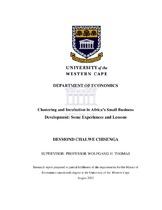| dc.description.abstract | There is a general recognition and acceptance that small and medium enterprises
(SMEs) are important contributors to social and economic development. However, in
Africa which hosts many developing economies, SMEs must endure numerous
challenges that tend to repress small enterprise development. Formal cluster
development programmes have been identified as one progressive way of assisting
SMEs to overcome the obstacles. It involves deliberately instituting and supporting
small enterprise clusters. Although this idea of formal clustering of firms is relatively
new to Africa, cluster development programmes are increasingly taking the form of
small business incubation. Business incubation essentially aims to provide a systematic
method of rendering business support services to fledgling small businesses to help
them continually rise above market challenges and thrive.
Some governments in Africa have embraced the notion and are incorporating plans into
their local economic development (LED) programmes to enhance small business
development through incubation. Countries like South Africa, Ghana, Kenya, and
Nigeria have amongst the most conspicuous incubator programmes and cluster
experiences on the African continent. This study interrogates the effectiveness of and
hence the scope for formal business incubation or rigid clustering programmes in
Africa. It assesses examples of both rigid and flexible clusters in a few African
countries in order to identify their main differences and to thus establish some critical
areas of business clustering needed for useful small and medium enterprise
development in Africa.
Upon reviewing case study literature, it is observed that formal incubation programmes
are likely to be less effective in creating new SMEs compared to the more flexible
clusters in Africa. Rigid clusters also tend to rely heavily on state funding, are more
subjected to political interference, are prone to expansion capacity constraints, and are
unlikely to sustain themselves financially in the long run. The study notes that rigid clustering mainly favours a high-tech environment. Hence, incubation programmes
may be more suitable for advanced economies. For low-tech industries, on the other
hand, formal business incubation may be inappropriate. | en_US |

